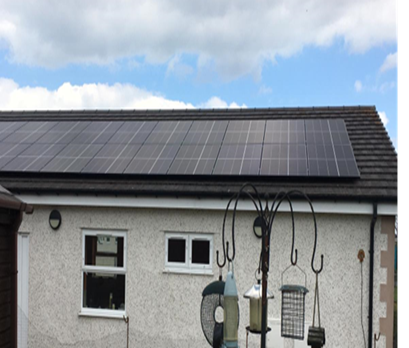
Reducing your nursery’s carbon footprint
Looking for ways of reducing your nursery’s carbon footprint? Margaret Hosie of NDNA Cymru member Caego Day Nursery shares how they used grant funding and the nursery’s resources to improve heating and insulation and install solar panels in the fight against climate change.
Caego Day Nursery was established in the Caego Village by Margaret Hosie in 1986. Margaret purchased the old dilapidated Church Hall, and has worked tirelessly with her family members to bring it up to today’s standards.
Why reduce your nursery’s carbon footprint?
We recognise it is the responsibility of everyone to play their part in making the effort to slow down global warming.
Management and staff in the nursery reinforce the importance of reducing our carbon footprint on our precious planet to everyone who contributes to the every day management of Caego Day Nursery.
You can start small
Following staff discussions we have made simple changes like:
- Supplying water butts for our children to collect rainwater to play with
- Reducing our everyday waste
- Introducing recyclable materials to be used within our departments, for example, cardboard boxes and empty containers being provided for children to use in their play
- Visual displays requesting lights to be switched off when not in use
- Using low-energy fairy lights wherever suitable
- Unplugging appliances wherever we can.
Update that boiler!
Every nursery proprietor knows that we all work on a tight budget.
However, although we made every effort to cut down in every area, we discovered our energy bills and the rising daily living costs were still trebling, stretching our finances to the limits.
In 2020, we had our old gas boilers of 25 years replaced with more energy-efficient ones. We also turned our radiators down as advised by British Gas. This did contribute to minimising our carbon footprint, as modern boilers work far more efficiently. We found we were in more control of our energy output, as we could regulate the new boilers more frequently to suit. The old boilers were left on constantly. This has proved to be really beneficial all round.
Innovate
As requested by the Welsh Government’s new curriculum guidelines we were instructed to have a free-flow indoor and outdoor system in place. But here’s my predicament:
Our outside canopy runs the whole length of the nursery. I was expected to leave doors leading from the building to the canopy wide open, even during the winter months, defeating my object of trying to retain energy and heat loss.
After a considerable amount of research, we decided to invest in a huge commercial outside curtain to protect staff and children from the cold weather and to prevent the loss of heat.

I approached a company in Telford that made curtains for lorries. A 33-meter-long commercial weighted curtain along the canopy was required. This meant our children would be able to go in and out with doors left open. This commercial heavy-duty curtain is placed on a stainless-steel track, welded onto the main canopy. The curtain slides back smoothly across each section, held in place by secure robust straps during the good weather.
At the same time, the curtain protects us all from the elements of cold weather, helping to reduce heat loss, as the heat is trapped under the canopy, and remains indoors by the curtains being so strongly designed.
This has worked out amazingly, still giving our children a feeling of being outside, yet remaining warm during the winter months. However, when our bills arrived over the winter months, we found them still spiralling and trebling.
Is solar the way to go?
Following a discussion with an electrician who came to change our old florescent light fittings, into new LCD light fittings, he explained that if we were to fit solar panels on the roof of the nursery, it would not only reduce our carbon footprint significantly but cut down our energy bills too.
Unfortunately, quotations were all in the region of £20,000 plus VAT. This was way over my budget.
Luckily we were approached by WCBC childcare team, informing us there was a small grant scheme we could apply for.

I approached several companies and chose to go with a local company.
We are yet to receive our new bills; we are registered as having the solar panels installed with our supplier. We will be informed of energy saving and what we are taking from the grid eventually.
Apparently, as a renewable source of power, solar energy has an important role critical to protecting humans, wildlife, and ecosystems. Solar energy can also improve air quality and reduce water use from energy production. Having the solar panels in the Caego Day Nursery, eases my conscience, knowing I am making every effort to reduce our carbon footprint, and hopefully will also assist us in reducing our soaring bills.
There are many challenges facing nurseries at the moment. The innovative approach taken at Caego Day Nursery with support from their local authority and access to grant funding has helped to ensure that they remain sustainable for the future by keeping their utility costs as low as possible. They have also been able to develop and promote green policies that support the fight against global warming and encourage an ethos of caring for the planet amongst the children they care for.
Further support
- 10 Top Tips on Grant Applications.
- Welsh Government’s Childcare and early years capital programme: small grants scheme guidance 2022 to 2025
Similar Articles
STEMinists in the making: Encouraging girls’ confidence in science

Early years activity: Pancake creations


